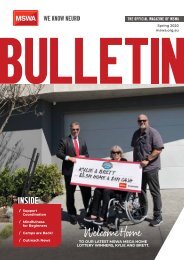MSWA Bulletin Magazine Spring 2021
What is assistive technology and how can it help you? | Good health monitoring practices | Pain and pain management series: Part 2 | Farewell Marcus Stafford
What is assistive technology and how can it help you? | Good health monitoring practices | Pain and pain management series: Part 2 | Farewell Marcus Stafford
You also want an ePaper? Increase the reach of your titles
YUMPU automatically turns print PDFs into web optimized ePapers that Google loves.
TYPES OF ASSISTIVE TECHNOLOGY<br />
Assistive technology can range in types and categories and can be disability-specific or mainstream. In recent years,<br />
there has also been more of a shift into making mainstream products such as tablets and computers more accessible<br />
to enable access for a person with a disability.<br />
The following are some categories and examples of assistive devices. Please note that this is not an exhaustive list<br />
and development in assistive devices are constantly improving:<br />
Category<br />
Mobility aids<br />
Transfer equipment<br />
Seating and positioning<br />
Temperature control<br />
Computer technology<br />
Physical modifications<br />
Adaptive devices for<br />
daily living<br />
Recreation<br />
Communication<br />
Examples<br />
Wheelchairs, scooters, walkers, canes, crutches, prosthetic devices, orthotic devices,<br />
guide dogs or assistance animals<br />
Hoists, transfer benches, vehicle transfer aids<br />
Recliners, adapted seating, cushions<br />
Air conditioners, cooling devices such as pillow and mattress protectors, cooling vests<br />
Computer software and hardware such as screen readers, screen enlargement apps<br />
and software, in-built accessibility programs in mainstream devices<br />
Modification for the built environment of the home or workplace including<br />
installation of grab rails, ramps, increasing doorways, circulation spaces. This can<br />
also include modifications of vehicles to enable safe transfers or driving techniques.<br />
Adaptive switches and utensils, specialised handles and grips, dressing aids,<br />
personal alarms, adapted personal hygiene aids<br />
Devices that enable participation in recreational and sporting activities include<br />
adaptive controls for video games, cuffs for grasping paddles or racquets etc.<br />
Devices that enable communication for people with speech and/or hearing difficulties.<br />
Examples include communication boards, text to voice software and specialised apps.<br />
MATCHING YOU TO THE RIGHT ASSISTIVE TECHNOLOGY<br />
Matching the person to the right AT for the right<br />
task can be a complex process that involves careful<br />
consideration of the person and their family members,<br />
the environment, the technology and the task involved.<br />
It involves technical knowledge of equipment and its<br />
interactions with the person and environment and a<br />
consultation process with the individual to come up with<br />
a product that would fit best to the individual’s needs.<br />
Before getting any equipment, it might be useful to<br />
consider these questions:<br />
/ What is my goal task to complete?<br />
/ What barriers are there that prevent me from<br />
achieving this goal?<br />
/ Who can assist me with selecting the right AT?<br />
/ Where can I find what AT is available?<br />
/ How will I determine which brand and features are<br />
the best for my needs?<br />
/ How will the AT be paid for?<br />
/ Can I trial the equipment?<br />
/ What kind of training do I need to use the AT?<br />
/ Who should I contact if I have follow up questions or if<br />
the equipment breaks down?<br />
WHERE TO SEEK HELP<br />
The <strong>MSWA</strong> Allied Health team comprises Occupational<br />
Therapists, Physiotherapists, Speech Pathologists and<br />
Nurses who can assist with assessing your needs and<br />
goals and sourcing the right fit for you in terms of your<br />
assistive technology needs.<br />
Your Support Coordinator or <strong>MSWA</strong> Client Liaison<br />
Coordinator can also assist with the funding from your<br />
NDIS plan if appropriate.<br />
You can also find out more information from Disability<br />
Gateway – a government portal for people with<br />
disabilities to source and connect with information and<br />
services that is relevant to their needs. It has a specific<br />
Assistive Technology page that can link you to more<br />
information and services depending on your needs and<br />
criteria: disabilitygateway.gov.au/aids-equipment<br />
CRYSTAL CHAN<br />
<strong>MSWA</strong> OCCUPATIONAL THERAPY MANAGER<br />
21

















